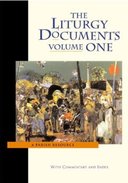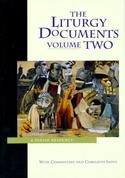Worship & Liturgy
Mass is the "source and summit" of Church life, and it is the one place and time that all active parishioners gather in a parish. Our liturgies send us forth in mission to the world.
Key Insights
|
Mission
The Mass is closely connected to our call to mission. In fact, the word Mass (based on the Latin word "Missa") means "sending" or "mission." |
Commentators
Consider resurrecting the role of the commentator for occasionally to explain the meaning of the parts of the liturgy and how it is connected with our mission. |
Quotations
[T]he Dismissal Rite at the end of Mass is supposed to send the entire congregation out into the world: "The Mass is ended. Go in peace to love and serve the Lord." This means we should carry out the mission of Jesus to proclaim and inaugurate the kingdom of God. When seen through the lens of the Dismissal, the entire Mass is aimed at this sending forth, and every single person in the congregation is being sent on a mission that is truly worthy of his or her life. Gregory F. Augustine Pierce
The Mass Is Never Ended: Rediscovering Our Mission to Transform the World ...those who are leaving the church for Protestant churches are more interested in spiritual nourishment than doctrinal issues. Tinkering with the wording of the creed at Mass is not going to help. No one except the Vatican and the bishops cares whether Jesus is “one in being” with the Father or “consubstantial” with the Father. That the hierarchy thinks this is important shows how out of it they are. |
From the liturgy, therefore, particularly the eucharist, grace is poured forth upon us as from a fountain; the liturgy is the source for achieving in the most effective way possible human sanctification and God's glorification, the end to which all the Church's other activities are directed. Constitution On the Sacred Liturgy (10)
Second Vatican Council On the whole, I do not find Christians, outside of the catacombs, sufficiently sensible of conditions. Does anyone have the foggiest idea what sort of power we so blithely invoke? Or, as I suspect, does no one believe a word of it? The churches are children playing on the floor with their chemistry sets, mixing up a batch of TNT to kill a Sunday morning. It is madness to wear ladies’ straw hats and velvet hats to church; we should all be wearing crash helmets. Ushers should issue life preservers and signal flares; they should lash us to our pews. For the sleeping god may wake someday and take offense, or the waking god may draw us out to where we can never return. Annie Dillard
A Eucharist which does not pass over into the concrete practice of love is intrinsically fragmented. Pope Benedict XVI
Deus Caritas Est |
The dismissal of the assembly is like the breaking of the bread. We have become "the bread of life" and "the cup of blessing" for the world. Now we are scattered, broken, poured out to be life for the world. What happens at home, at work, at meals? What do we make of our time, our words, our deeds, our resources of all kinds? That is what matters. Joseph Cardinal Bernadin
Our Communion, Our Peace, Our Promise: Pastoral Letter on the Liturgy Why not make the Lord's Day a more intense time of sharing, encouraging all the inventiveness of which Christian charity is capable? Inviting to a meal people who are alone, visiting the sick, providing food for John Paul II
Dies Domini (72) |
Church Documents
There are many Church documents related to liturgy, so we recommend that those involved in planning Catholic liturgy purchase a collection of these documents:
Books
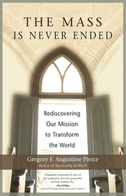
The Mass Is Never Ended: Rediscovering Our Mission to Transform the World
Gregory F. Augustine Pierce The Mass of the Catholic Church provides everything we need to be happy, holy, and fulfilled in our lives: a mission worthy of our lives, a community to send us forth, and a spirituality of work. These three embody the 15 chapters of The Mass Is Never Ended, each of which closes with a short "story about" that synthesizes the topic and questions for reflection and discussion. (Amazon) |
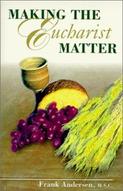
Making the Eucharist Matter
Frank Andersen, MSC How can it be that many find the celebration at the heart of Christian faith merely routine-or even meaningless? What can we do about it? Anderson addresses these questions head-on, exploring how the liturgy's meaning can come alive for us, how it can ennoble and involve us. He explores the extraordinary possibilities that the Eucharist affords us. (Amazon) |
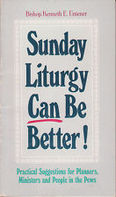
Sunday Liturgy Can Be Better! Practical Suggestions for Planners, MInisters and People in the Pews
Bishop Kenneth E. Untener In this book, Bishop Untener deals more with the ways liturgies are celebrated than with liturgical theory. His oft-humorous and down-to-earth appraisal of the problems and possibilities of parish worship can help you help others -- and help yourself -- pray better at your Sunday liturgy. (Amazon) |
Articles
- Ritual & Community: What I've Learned in the Parishes (Bishop Kenneth Untener)
Organizations & Websites

Ministry & Liturgy Magazine
In addition to features and regular columns on topics of interest to the entire parish team — rites, music, faith formation, Scripture, art and architecture, hospitality, and many others — you will find valuable tools and inspiration in every issue. |
Parish Resources
|
Eucharist: Body of Christ Broken For the World (Eucharist) is a two-page handout outlining how Eucharist sends us on a mission to the world, as related by papal statements. It was produced by the Department of Justice, Peace and Human Development, United States Conference of Catholic Bishops.
Your browser does not support viewing this document. Click here to download the document.
|
Eucharist: Body of Christ Broken For the World (Liturgy) is a two-page handout outlining how the different parts of the Eucharistic liturgy send us on a mission to the world. It was produced by the Department of Justice, Peace and Human Development, United States Conference of Catholic Bishops.
Your browser does not support viewing this document. Click here to download the document.
|
Related To
|
Adapt aspects of the liturgy to the cycle of the liturgical year and secular calendar.
|
